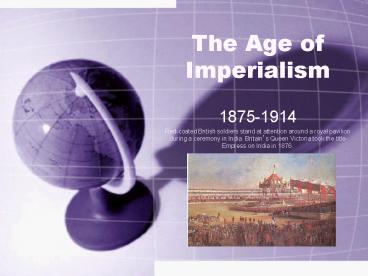The Age of Imperialism - PowerPoint PPT Presentation
1 / 9
Title:
The Age of Imperialism
Description:
Title: The Age of Imperialism Author: Bradely Wade Bishop Last modified by: Brianna Hargrove Created Date: 4/2/2005 5:38:56 PM Document presentation format – PowerPoint PPT presentation
Number of Views:122
Avg rating:3.0/5.0
Title: The Age of Imperialism
1
The Age of Imperialism
- 1875-1914
- Red-coated British soldiers stand at attention
around a royal pavilion during a ceremony in
India. Britains Queen Victoria took the title
Empress on India in 1876.
2
The Age of Imperialism
- Imperialism
- a policy of conquering and ruling other lands
3
Nations competed for overseas empires. Britains
lead was challenged.
- In the mid-1800s, Britain was the most powerful
nation in the world. - Its factories produced more good than those of
any other country. - The British Navy guarded the oceans.
- British banks loaned the money needed.
- By the late 1800s, however, Germany and the
United States were challenging Britains economic
leadership. - Faced with possible decline, Britain looked
increasingly to its colonies for markets and
resources.
4
Nations competed for overseas empires.Imperialism
fostered rivalries.
- Other countries followed Britains lead and came
to see colonies as necessary for their economic
well-being. - The French and Dutch expanded their holdings.
- Spain and Portugal attempted to build new empires
in Africa. - Austria-Hungary moved into the Balkans.
- Russia expanded into the Caucasus, Central Asia,
and Siberia. - Countries that had no colonies set out to acquire
them. - Belgium, Italy, and Germany all took over lands
in Africa (with Germany also taking an interest
in East Asia the Pacific islands).
5
Nations competed for overseas empires.Imperialism
fostered rivalries.
- (continued)
- Two non-European countries, the United States and
Japan, also became involved in overseas expansion
during this period. - Both the U.S. and Japan were interested in East
Asia. - The U.S. was also deeply tied to Latin America.
- Increasingly, Europeans viewed an empire as a
measure of national stature. - Thus, the race for colonies grew out of a strong
sense of national pride as well as from economic
competition.
6
Nations competed for overseas empires.Europe
believed in its own superiority.
- Following the Industrial Revolution, Europeans
regarded their new technology (weaponry,
telegraphs, railroads etc.) as proof they were
better than other peoples. - This attitude is a reflection of racism, the
belief that one race is superior to others. - Europeans believed that they had the right and
duty to bring the results of their progress to
other countries.
7
Nations competed for overseas empires.Imperialism
had mass appeal.
- (continued)
- Novels and poetry also glorified Imperialism .
- The most popular writer of the day was Joseph
Rudyard Kipling (1865-1936). - Kipling appealed not only to his readers sense
of adventure but also the their feelings of
superiority. - He saw imperialism as a mission to civilize
non-Europeans and urged his readers to - Take up the White Mans Burden-
- Send forth the best ye breed-
- Go bind your sons to exile-
- To serve your captives need
8
The Age of Imperialism
- In answering the call of imperialism, Europeans
altered the way of life on every continent.
9
The Age of Imperialism
- Questions to Consider
- (a) What countries challenged Britains economic
leadership? (b) How was the search for colonies
a response to Britains declining share in world
trade? - What attitude did people in industrialized
countries have toward other peoples? - Reread the lines from Kiplings poem. (a) What
did he mean by the White Mans Burden? (b) What
does the word captives indicate?































